Angie Blu-ray Movie
HomeAngie Blu-ray Movie 
Kino Lorber | 1994 | 107 min | Rated R | Feb 06, 2018
Movie rating
5.5 | / 10 |
Blu-ray rating
| Users | 0.0 | |
| Reviewer | 3.5 | |
| Overall | 3.5 |
Overview
Angie (1994)
Two best friends, Angie and Tina, are young, working class women from Bensonhurst, Brooklyn. When Angie decides to have a baby without marrying the father, everyone in town has something to say about it.
Starring: Geena Davis, Stephen Rea, James Gandolfini, Aida Turturro, Michael RispoliDirector: Martha Coolidge
| Romance | Uncertain |
| Comedy | Uncertain |
| Drama | Uncertain |
Specifications
Video
Video codec: MPEG-4 AVC
Video resolution: 1080p
Aspect ratio: 2.35:1
Original aspect ratio: 2.39:1
Audio
English: DTS-HD Master Audio 2.0
Subtitles
English SDH
Discs
Blu-ray Disc
Single disc (1 BD)
Playback
Region A (B, C untested)
Review
Rating summary
| Movie | 2.0 | |
| Video | 3.0 | |
| Audio | 4.0 | |
| Extras | 4.5 | |
| Overall | 3.5 |
Angie Blu-ray Movie Review
Reviewed by Brian Orndorf January 21, 20181994 represents a period of stumbling in the career of Geena Davis. After reaching critical and box office highs with “Thelma and Louise” and “A League of Their Own” in the early 1990s, Davis had trouble keeping up the pace, with 1994 hurting her momentum with the release of “Speechless” and “Angie,” a feature which offers a leading role most actresses would kill for, tasked with portraying a complicated woman who quests for independence while smothered by tradition. Davis is up for the task, taking the part seriously with a strong lead performance that hits all the emotional bullet points, but “Angie” has problems with focus, with director Martha Coolidge struggling like mad to keep the titular character on a defined journey of self as dozens of subplots and supporting characters compete for attention. It’s a dramatic juggling act Coolidge has difficulty mastering, sending the final cut smashing across melodramatic extremes that dilute the intense character odyssey promised in the opening act.
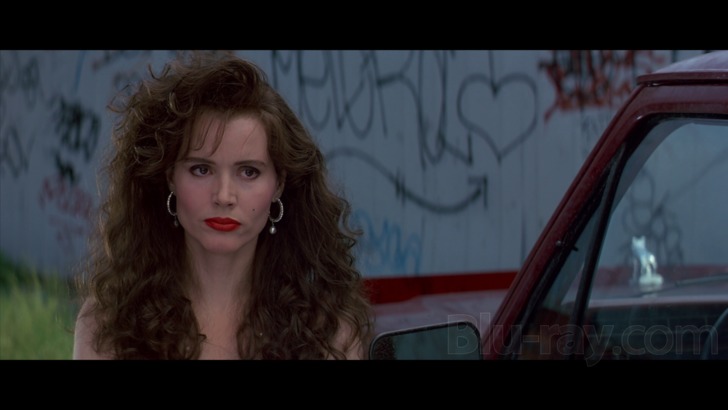
Angie (Geena Davis) has struggled to mature into a professional woman after being abandoned by her mother, raised by her father, Frank (Philip Bosco), and her step-mother, Kathy (Jenny O’Hara), a woman she doesn’t like. Joined by pal Tina (Aida Turturro), Angie plays by the rules, keeping an office job she doesn’t love and a boyfriend in Vinnie (James Gandolfini) she’s no longer interested in. However, when she discovers that she’s pregnant, Angie pushes to make changes in her life, finding excitement with lawyer Noel (Stephen Rea), who offers her culture and happiness. As motherhood looms, Angie is forced to come to terms with the reality of her situation, still stinging from unfinished business with her mother, which clouds a future that begins to feel more like a prison as the weight of responsibility proves to be too heavy to carry.
“Angie” is an adaptation of a book by Avra Wing, giving screenwriter Todd Graff the challenge of prioritizing issues in Angie’s life. Having been abandoned by her mother as a child, Angie is left in a holding pattern of development, haunted by the mystery of her guardian’s erratic behavior, the severity of which is gradually exposed as the story unfolds. Angie persists due to her Bensonhurst upbringing, creating a life for herself that’s expected but not treasured, keeping up professional obligations while dealing with Vinnie, a dopey plumber who’s ready to pin down his girlfriend with marriage plans after learning about her pregnancy. Coolidge and Graff offer passable introductions for most of the supporting players, but once personalities are established, most of them fade away until absolutely needed, with Tina a prominent question mark, struggling in a verbally abusive marriage that’s introduced with emphasis, only to be erased from the rest of the picture.
Angie experiences a wake-up call with her pregnancy, suddenly realizing that she’s surrounded by culturally challenged types, making her connection to Noel (their meet cute occurs in an art museum) understandable. He offers laughs and refined outings to the ballet, giving Angie a cozy place to nest while she ignores her upcoming birth. However, the clarity of this delusion is difficult to grasp in full, as Graff and Coolidge have so much more plot to work through and characters to position for climatic payoffs. Everything seems undercooked in “Angie,” with Noel suffering from a lack of meaningful screen time, while Rea isn’t ideally suited for playfulness, inadvertently projecting a level of cruelty to the lawyer’s behavior that doesn’t appear to be intentional.
“Angie” has tonal problems, leaping around disasters in the character’s packed life. There are a few vivid issues with breastfeeding and Kathy’s haunted backstory that complicate the story in a meaningful way, delivering an unexpected look at the concerns of motherhood, but, like everything else in the movie, charged moments are only a brief concern for the production, which soon takes off again, trying to compact Wing’s novel into a sweeping assessment of grief, fear, and identity, snipping off most connective tissue along the way.
Angie Blu-ray Movie, Video Quality 
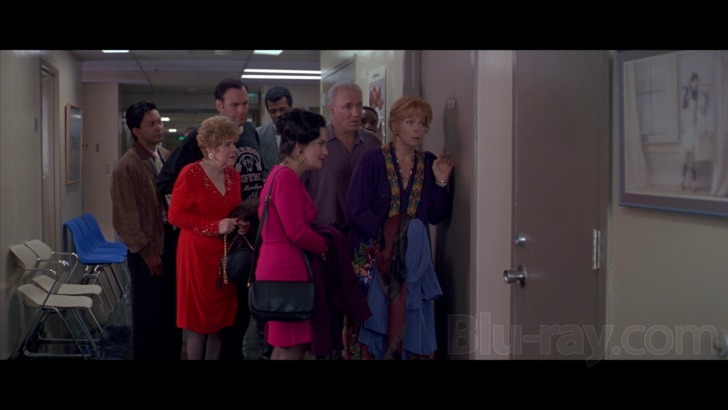
Originally released on Blu-ray six years ago, "Angie" makes a second pass at an HD release, offering an AVC encoded image (2.35:1 aspect ratio) presentation. The viewing experience is satisfactory but never revelatory, delivering an adequate amount of detail, with facial particulars periodically clear and bright (showing some baked-in filtering), and costumes offer passable textures. Neighborhood distances are also dimensional. Primaries are bold, with deep reds on lipstick and lighter blues for hospital visits. Skintones are natural. Delineation struggles some in limited lighting, suggesting an older scan. Source is in fine shape, without damage. Some scenes showcase slight vertical stretch, but this appears to be an inherent cinematographic issue, not consistent throughout the movie.
Angie Blu-ray Movie, Audio Quality 
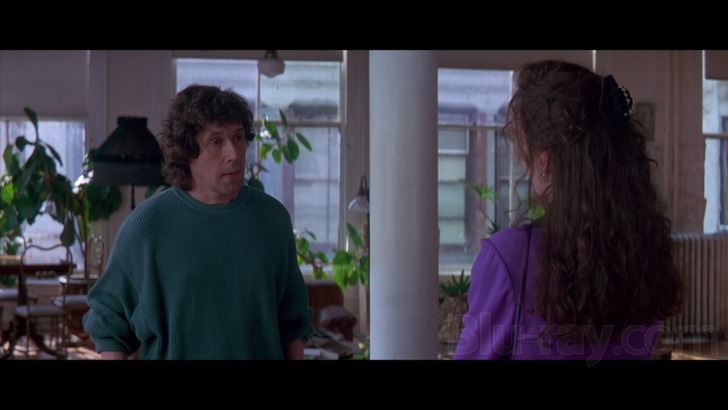
The 2.0 DTS-HD MA sound mix gives "Angie" some presence, with soundtrack selections adding some pop music bounce, while scoring carries compelling instrumentation. Dialogue exchanges are appealing, offering crisp voices and steady emotional surges, never spilling over into distortion. Atmospherics are mild, but urban tours retain background activity, and hospital visits offer some bustle.
Angie Blu-ray Movie, Special Features and Extras 
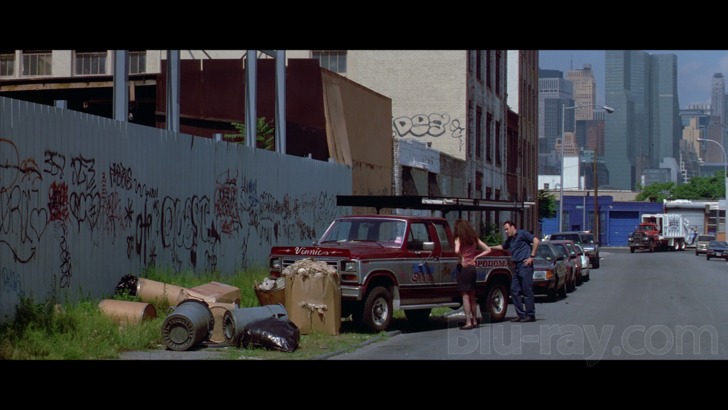
Interestingly, Kino Lorber has ported over the supplements from the 1994 laserdisc release of "Angie," providing a trip back to a time when extras were meant to educate the viewer on the filmmaking process.
- Commentary features director Martha Coolidge.
- Laserdisc Extras #1 (18:39, SD) include parts of the EPK experience, with cast and crew interviews (conducted on-set) exploring how "Angie" came to be. Screenplay adaptation challenges are handled by writer Todd Graff, while Coolidge discusses her approach to the story and the setting, with the production getting a feel for authenticity by shooting in Bensonhurst. Costume designs are shared, along with a humorous overview of research, with Geena Davis attending a live birth to learn more about the process (ultimately asked to autograph the birth certificate). Coolidge also mentions personal experiences that informed certain scenes. A Theatrical Trailer and a deleted scene are also included, with the director casually mentioning that "Angie" lost an hour of story(!) on its way to a final cut.
- Laserdisc Extras #2 (26:33, SD) returns to Coolidge, who examines script changes made during development, including a bizarre last-minute choice to swap names between the characters played by Davis and Aida Turturro, leading to some confusion. Coolidge also details a significant change to the end of the movie, with the original conclusion closing the picture on a much darker note. A lengthy examination of the ballet sequence takes up most of the time here, with the director sharing the full version of the show Angie and Noel attend, and there's a comparison between edits of Angie's bus ride, where she reflects on her mother's ballet dreams. Storyboards are included to learn more about technical shots, including a mirror gag involving Davis and a real pregnant woman, and more changes are highlighted, with Noel originally Noah, a Jewish lawyer. Selections from a still archive are presented, along with American and British poster art.
- And a Theatrical Trailer (2:17, SD) is included.
Angie Blu-ray Movie, Overall Score and Recommendation 
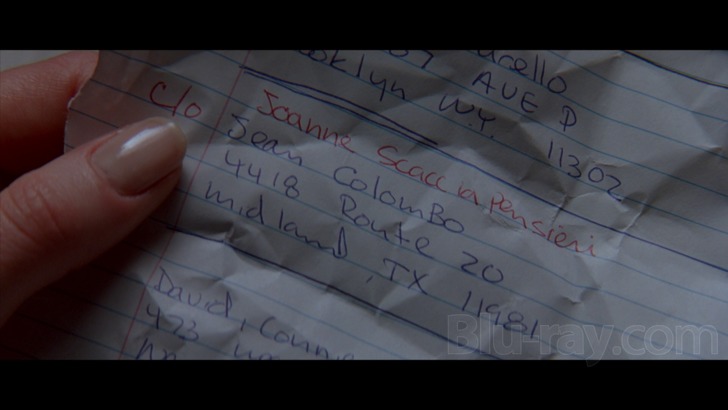
"Angie" is a frustrating sit, though Coolidge does pull off some fascinating movie magic tricks, including one that uses careful choreography and double work to sell the visual of a nude Angie looking at herself in the mirror. Sadly, there's not much presented here that's cohesive, with Coolidge cutting the effort down to a highlight reel of pain that culminates in a medical issue for Angie's baby, which is almost too depressing to bear, soon stacked under a previously established mother mystery that feels as though it should be more profound than it ends up becoming. "Angie" tries to keep a beaming spirit, and there is humor (Angie is tasked with singing selections from "A Chorus Line" during her labor), but the finished film is too disjointed to stimulate sympathies, resembling a trailer for a longer cut that was ditched in editing room to help maximize the picture's marketplace potential.
Similar titles
Similar titles you might also like

Then She Found Me
2007

In Her Shoes
2005

Something Borrowed
Movie Only Edition
2011

Sex and the City: The Complete Series
Sex and the City: The Movie / Sex and the City 2
1998-2010

The Sisterhood of the Traveling Pants 2
2008

What to Expect When You're Expecting
2012

Admission
2013

Juno
Special Edition
2007

Made for Each Other
1939

Delirious
Director's Cut | Special Edition
2006

Garden State
2004

Meet Monica Velour
2010

Waitress
2007

Bridget Jones's Diary
2001

Definitely, Maybe
2008

No Reservations
2007

Love, Rosie
2014

The Devil Wears Prada
10th Anniversary Edition
2006

Prime
2005

Suburban Girl
2007